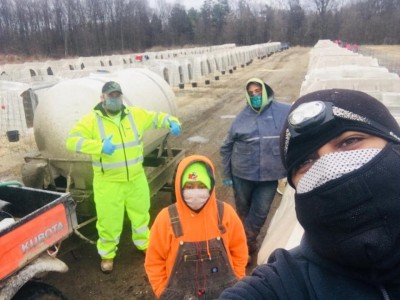Face Covering Required for Essential Workers With Direct Public Contact
Katelyn Walley, Business Management Specialist and Team Leader
Southwest New York Dairy, Livestock and Field Crops Program

Originally published on the Cornell Agricultural Workforce Development website.
On April 12, New York Governor Cuomo issued an executive order that included the following text:
"For all essential businesses or entities, any employees who are present in the workplace shall be provided and shall wear face coverings when in direct contact with customers or members of the public. Businesses must provide, at their expense, such face coverings for their employees. This provision may be enforced by local governments or local law enforcement as if it were an order pursuant to section 12 or 12-b of the Public Health Law. This requirement shall be effective Wednesday, April 15 at 8 p.m."Of course, farm employees are "essential businesses" so this order applies to farm employees. However, the order also limits the requirement to only when employees are "in direct contact with customers or members of the public." Until we have any further guidance it seems reasonable that this face covering requirement would apply to farm employees working in U-pick, farm market, or other customer-facing environments. It might also apply to farm employees who must interact with other non-farm employees such as delivery personnel as part of their jobs, such as office staff. Farms should interpret the executive order for their specific context with the intent of protecting the health of employees and those they must interact with.
New York's executive order came in the context of the U.S. Centers for Disease Control (CDC) now recommending the widespread use of cloth face coverings to slow the spread of COVID-19. It's important to share a recent CDC statement about this:
"CDC continues to study the spread and effects of the novel coronavirus across the United States. We now know from recent studies that a significant portion of individuals with coronavirus lack symptoms ("asymptomatic") and that even those who eventually develop symptoms ("pre-symptomatic") can transmit the virus to others before showing symptoms. This means that the virus can spread between people interacting in close proximity—for example, speaking, coughing, or sneezing—even if those people are not exhibiting symptoms. In light of this new evidence, CDC recommends wearing cloth face coverings in public settings where other social distancing measures are difficult to maintain (e.g., grocery stores and pharmacies) especially in areas of significant community-based transmission."In this context, many farms are issuing cloth face masks to employees as another way to help prevent the spread of COVID-19. Mapleview Dairy in Madrid, NY recently posted on Facebook a photo of their team wearing cloth face coverings and a video showing part of the farm's daily mask cleaning and preparation procedure.
CDC provides instructions for making cloth face coverings on their web page. The Cornell Farmworker Program is working with community groups to organize face mask production and distribution to farm workers. Many farms are reaching out to people in their community to help, Mapleview used a local embroidery shop to source their face coverings. Farms should consider finding a source of face coverings to provide for employees and adding this tool to help fight COVID-19.
CDC also recommends that face coverings be cleaned regularly using an ordinary laundry process. Farms should consider building the cleaning step into their procedures.
Working together, our farming industry will overcome COVID-19 and keep on providing for farmers, farm employees, rural communities, and the public who depends on us.
By Richard Stup, Cornell University. Permission granted to repost, quote, and reprint with author attribution. The post Face Coverings Required for Essential Workers With Direct Public Contact appeared in The Ag Workforce Journal
Upcoming Events
WNY Pastureland Conversion & Soil Health Field Day
July 16, 2025
Middleport, NY
Join American Farmland Trust for the Western New York Soil Health Field Day on July 16, 2025, at Zeliff Farm in Middleport, NY, from 9:00 AM-3:15 PM. Learn about pasture conversion, soil health benchmarking, biochar in grazing systems, and best grazing practices. Plus, enjoy hands-on demos with the NY Soil Health Trailer, drones, and cover crops! Check out the attached agenda for more information about the field day and REGISTER HERE. Zeliff Farms is a regenerative beef operation who has recently partnered with AFT on outreach and education to farmers including learning circles and evaluating biochar effects on soil health.
IPM Strategies to Protect Corn and Soybean Seed in NY
July 30, 2025
Hamburg , NY
SWNYDLFC and Cornell IPM are hosting a grower meeting to discuss integrated pest management strategies for protecting corn and soybean seed in New York.
FAMACHA Training for Sheep and Goat producers in Woodhull NY
August 13, 2025 : FAMACHA Training in Woodhull
Woodhull, NY
Join us for a discussion and hands-on training for internal parasite integrated pest management in sheep and goats. Certification is available to all students participating in the workshop.
Announcements
No announcements at this time.





